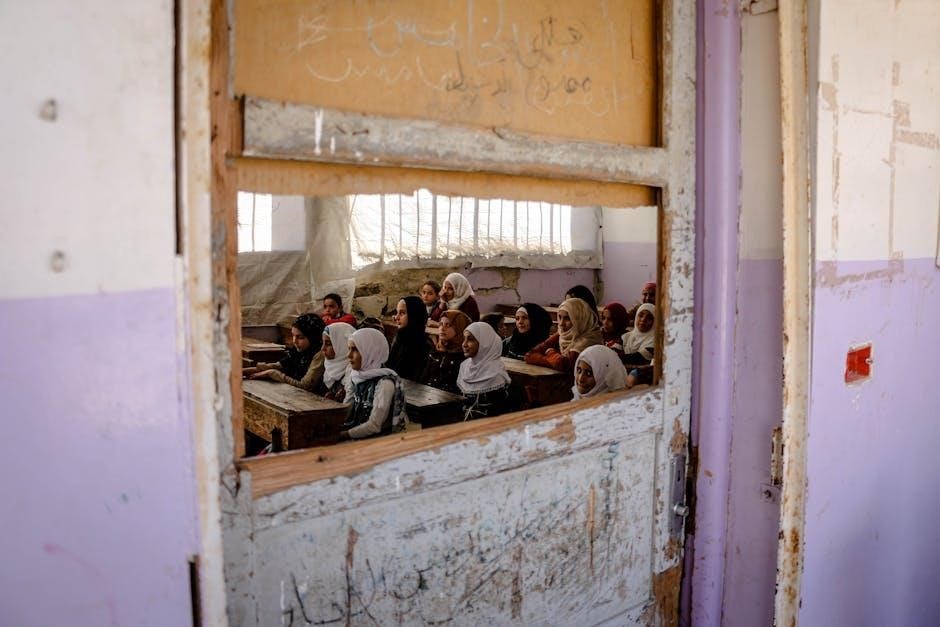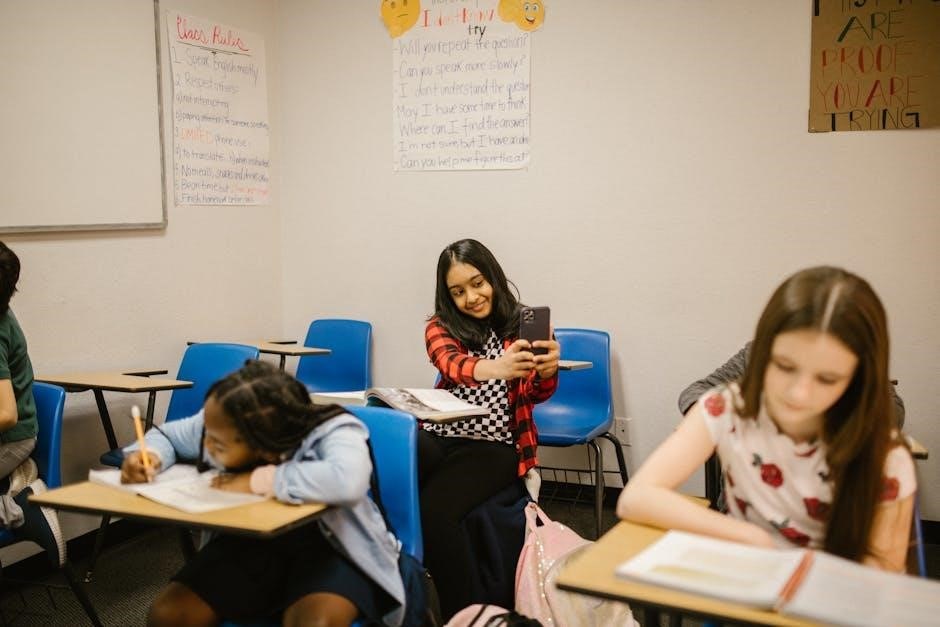
An argumentative essay teaches students to express opinions clearly, using evidence to support their claims. It helps develop critical thinking and persuasive writing skills, essential for academic success.
1;1 What is an Argumentative Essay?
An argumentative essay is a type of writing where a student takes a clear stance on a debatable topic and supports it with evidence; It requires presenting a claim, providing logical reasoning, and addressing counterarguments. The goal is to persuade the reader to agree with the writer’s perspective. Unlike other essays, argumentative writing focuses on controversial issues, encouraging critical thinking and effective communication. Students learn to structure their essays with a clear thesis, supporting evidence, and a conclusion that reinforces their position. This format helps middle schoolers develop persuasive skills, essential for academic and real-world applications.
1.2 Importance of Argumentative Writing for Middle School Students
Argumentative writing is crucial for middle school students as it enhances critical thinking and communication skills. It encourages students to analyze topics, gather evidence, and form logical arguments. This process helps build confidence in expressing opinions and prepares them for academic and professional challenges. Argumentative essays also foster creativity and empathy by considering multiple perspectives. By engaging with diverse viewpoints, students develop a deeper understanding of complex issues. Additionally, mastering argumentative writing improves overall academic performance and equips students with tools to advocate for themselves and others effectively. It is a foundational skill that benefits students throughout their lives.
1.3 How to Choose the Right Topic for a Middle School Argumentative Essay
Selecting the right topic is essential for a successful argumentative essay. Middle school students should choose topics that are relevant, debatable, and personally interesting. Consider issues that affect their daily lives, such as school policies, social media, or extracurricular activities. Topics like “Should School Uniforms Be Mandatory?” or “Is Social Media Having a Negative Impact on Teenagers?” are ideal because they have clear arguments for both sides. Avoid overly broad topics and focus on specific issues. Ensure the topic has enough evidence to support a strong argument and aligns with the audience’s interests. This approach helps students stay engaged and produces a well-supported essay.

Popular Argumentative Essay Topics in Education
Common topics include debates on school uniforms, year-round schooling, and standardized testing. These issues spark meaningful discussions and provide ample evidence for argumentation.
2.1 Should School Uniforms Be Mandatory?
The debate over mandatory school uniforms is a popular argumentative topic. Proponents argue that uniforms reduce bullying, promote equality, and improve focus on academics. They also believe uniforms foster a professional learning environment and simplify morning routines for students. On the other hand, opponents claim uniforms restrict personal expression and creativity. They argue that students should have the freedom to choose their clothing, as it reflects their identity. Additionally, some families may find uniforms costly or uncomfortable. To form a strong argument, students must weigh the pros and cons, consider evidence from schools with and without uniform policies, and address counterarguments effectively. This topic encourages critical thinking about balancing individuality and conformity in educational settings.
2.2 Year-Round Schooling: Pros and Cons
Year-round schooling is another debated topic in education. Advocates argue that it reduces the “summer slide,” where students forget information during long breaks. Continuous learning can improve academic performance and retention. It also offers more balanced breaks throughout the year, which can benefit working families. However, critics claim it limits summer opportunities like camps, jobs, or family vacations. Some argue it increases costs for schools and families due to extended operations. Students must research both sides, considering academic outcomes, economic impacts, and social effects. This topic encourages evaluating how education systems can adapt to modern needs while addressing potential drawbacks. Balancing these factors is key to forming a compelling argument.
2.3 Should Standardized Tests Be Required for Middle School Students?
Standardized testing is a contentious issue in education. Proponents argue that these tests provide a consistent measure of student performance, helping schools identify areas for improvement. They also prepare students for high-stakes exams in higher education. However, critics contend that standardized tests create undue stress and can lead to teaching practices focused solely on test preparation. Some argue that these tests don’t account for individual learning styles or creativity. Additionally, there are concerns about equity, as not all students have equal access to test preparation resources. Students should explore both perspectives, evaluating the impact of standardized tests on education quality and student well-being to form a balanced argument.

Technology and Social Media Topics
Explore debates on technology and social media’s role in education and society. Topics include cell phone use in classrooms, social media’s impact on teens, and its potential as a learning tool.
3.1 Should Cell Phones Be Allowed in Middle School Classrooms?
Debating whether cell phones should be allowed in middle school classrooms sparks lively discussions. Proponents argue that phones enable quick access to information, promoting interactive learning and engagement. They also serve as tools for research and collaboration during group projects. Additionally, phones can be vital in emergencies, ensuring student safety. However, critics emphasize the potential for distractions, such as texting or gaming, which can hinder focus and academic performance. Some schools implement strict policies, while others adopt more flexible approaches. Balancing convenience and responsibility is key, as educators seek to maximize benefits while minimizing disruptions.
3.2 Is Social Media Having a Negative Impact on Teenagers?
Social media’s influence on teenagers is a widely debated topic. Critics argue that platforms like Instagram and TikTok contribute to mental health issues, such as anxiety and low self-esteem, due to unrealistic comparisons. Excessive screen time can also lead to decreased physical activity and face-to-face interaction, affecting social skills. Additionally, cyberbullying and exposure to inappropriate content pose serious risks. However, supporters highlight social media’s role in fostering connections and self-expression. It provides a space for teenagers to share ideas and access resources. The key lies in moderation and responsible usage. Schools and parents must guide teenagers to navigate these platforms wisely, ensuring a balance between benefits and risks.
3.4 Should Social Media Be Used as a Learning Tool?
Using social media as a learning tool sparks debate among educators and students. Proponents argue that platforms like YouTube and TikTok offer engaging, interactive content that can enhance traditional teaching methods. For instance, educational channels provide visual explanations of complex concepts, making learning more accessible. Social media also fosters collaboration, allowing students to share ideas and work on group projects remotely. Additionally, it prepares students for a digital future by teaching them how to navigate and utilize online resources effectively. However, critics raise concerns about distractions and misinformation. To maximize benefits, educators must integrate social media thoughtfully, ensuring it complements rather than detracts from academic goals. The potential is vast, but balance is key.

Health and Safety Issues
Debates on health and safety in schools include topics like drug testing, football risks, and free meals, aiming to protect students while addressing ethical concerns.
4.1 Should Middle School Students Be Drug Tested?
Drug testing middle school students sparks debate over safety, privacy, and effectiveness. Proponents argue it could prevent drug abuse and ensure a secure learning environment. They suggest it might discourage experimentation and help identify students needing support. However, opponents raise concerns about privacy rights and potential discrimination. They argue that testing could harm the trust between students and school authorities. Additionally, critics question its effectiveness, citing concerns about false positives and the financial burden on schools. Others believe resources could be better spent on education and counseling rather than testing. This topic encourages students to weigh individual rights against societal responsibilities, fostering critical thinking on health and ethics.
4.2 Is Football Too Dangerous for Middle School Students?
Football is a popular sport, but its safety for middle school students is debated. Injuries, particularly concussions, are a major concern, as they can lead to long-term health issues like brain damage or chronic traumatic encephalopathy (CTE). Critics argue that young athletes’ developing bodies are more vulnerable to harm. They also point out that improper tackling techniques and lack of proper equipment can exacerbate risks. On the other hand, supporters believe football teaches teamwork, discipline, and physical fitness. They suggest that with improved safety protocols, such as better helmets and training, the risks can be minimized. This topic encourages students to weigh the benefits of sports participation against potential health risks, promoting a balanced perspective on student athletics and safety.

4.3 Should Schools Provide Free Meals for All Students?
Providing free meals for all students is a topic of growing debate. Proponents argue that it ensures no child goes hungry, improving concentration and academic performance. It also reduces the stigma faced by students who cannot afford meals. Additionally, free meals can address food insecurity, particularly in low-income areas. However, critics raise concerns about the cost, questioning how schools would fund such programs without increasing taxes or cutting other essential services. Some also suggest that free meals might lead to waste or misuse. This issue prompts students to consider the balance between educational equity, nutritional health, and financial practicality, making it a compelling argumentative topic for middle schoolers to explore.

Extracurricular Activities and Sports
Extracurricular activities and sports play a vital role in fostering teamwork, discipline, and personal growth. They provide students with opportunities to develop skills beyond academics, sparking creativity and fostering leadership. Engaging in sports also promotes physical health and mental well-being, creating a balanced lifestyle for students. These activities often serve as platforms for building friendships and learning essential life skills. Argumentative essays on this topic encourage students to explore the importance of these activities and their impact on overall development, making them a dynamic and engaging subject for discussion and debate among middle schoolers.
5.1 Should Playing Video Games Be Considered a Sport?

The debate over whether video games should be classified as sports sparks intense discussion. Proponents argue that competitive gaming requires skill, strategy, and teamwork, similar to traditional sports. They point to the physical and mental stamina needed for long gaming sessions and the growing recognition of esports as a legitimate competition. However, critics contend that video games lack the physical activity typically associated with sports. They argue that sports involve bodily movement and athleticism, which gaming does not. This topic encourages students to explore the evolving definition of sports and consider how societal perceptions shape our understanding of competition and athleticism. It’s a thought-provoking subject for middle school argumentative essays.
5.2 Should Middle Schools Require Students to Participate in Extracurricular Activities?
Mandatory participation in extracurricular activities is a controversial topic in middle schools. Advocates believe these activities foster teamwork, leadership, and social skills, benefiting students’ overall development. They also argue that extracurriculars can reduce boredom and improve academic performance by keeping students engaged. However, opponents suggest that requiring participation may lead to burnout or unfair pressure on students with family or work commitments. They emphasize that students should have the freedom to choose activities they genuinely enjoy. This topic encourages students to weigh the benefits of structured activities against personal freedom, making it an engaging subject for argumentative essays. It’s a relevant issue for middle school students to explore and debate.

Social and Cultural Topics
Social and cultural topics spark debates, such as gender-separated schools, bullying prevalence, and religious education. These issues are vital for middle schoolers to explore and discuss.
6.1 Should Boys and Girls Attend Separate Schools?
The debate on whether boys and girls should attend separate schools is a popular argumentative topic. Proponents argue that single-gender classrooms reduce distractions and allow tailored teaching methods, potentially improving academic performance. They suggest that boys and girls have different learning styles and developmental needs, which can be better addressed in separate environments. For instance, boys might benefit from more active learning strategies, while girls could thrive in collaborative settings. However, opponents claim that co-education prepares students for real-world interactions and fosters mutual understanding. They argue that segregation might lead to stereotypes and limit social skills. This topic encourages students to weigh the pros and cons while developing their critical thinking skills.
6.2 Is Bullying a Major Problem in Middle Schools?
Bullying is a significant issue in many middle schools, affecting students’ emotional well-being and academic performance. It can take various forms, including verbal, physical, and social bullying, often leading to anxiety, depression, and social isolation. Students who are bullied may struggle with low self-esteem and decreased confidence, which can impact their ability to succeed in school. Additionally, bullying creates a hostile learning environment, making it difficult for victims to focus and thrive. While some argue that bullying is a natural part of growing up, others believe it requires immediate attention and intervention. Schools must implement effective anti-bullying programs to create a safer and more supportive atmosphere for all students.

6.3 Should Schools Teach Religious Studies as Part of the Curriculum?
Teaching religious studies in schools sparks debate about its role in education. Proponents argue it fosters cultural understanding, tolerance, and moral values, enriching students’ perspectives on diverse religions. They believe it helps students appreciate different beliefs and traditions, promoting empathy and respect. However, opponents worry it may lead to bias, favoring one religion over others, and potential conflicts in multicultural classrooms. They argue schools should remain neutral, focusing on secular education to avoid influencing students’ religious beliefs. The challenge lies in balancing educational goals with religious sensitivity, ensuring the curriculum is inclusive and respectful of all backgrounds without imposing specific beliefs. This makes religious studies a controversial yet thought-provoking topic for discussion.

Writing Tips for Argumentative Essays
Start with a clear thesis, use evidence to support claims, address counterarguments, and conclude persuasively. Ensure logical flow and strong persuasive language throughout the essay.
7.1 How to Structure an Argumentative Essay
An argumentative essay should start with an introduction that includes a clear thesis statement. The body paragraphs present claims supported by evidence, addressing both sides of the argument. Each paragraph should focus on one main idea, with transitions connecting the sections. The conclusion restates the thesis and summarizes key points, ending with a strong closing statement. Ensure logical flow and coherence throughout the essay to effectively persuade the reader.
7.2 Tips for Conducting Research and Gathering Evidence
Conducting research for an argumentative essay involves identifying credible sources and gathering relevant evidence. Start by brainstorming keywords related to your topic and use academic databases or reputable websites. Evaluate sources for bias and reliability, ensuring a balanced perspective. Organize your findings by categorizing information that supports your claim and counterarguments. Use quotes, statistics, or expert opinions to strengthen your points. Always cite sources properly to avoid plagiarism. Teaching students to critically assess information helps them build a well-supported argument. Encourage them to explore multiple viewpoints and use evidence effectively to persuade their audience.
7.3 How to Counterargue in an Argumentative Essay
Counterarguing in an argumentative essay involves addressing opposing viewpoints to strengthen your position. Acknowledge the counterarguments and present them fairly, showing you’ve considered different perspectives. Refute these points with evidence or logical reasoning, demonstrating why your argument is more valid. Use phrases like “On the other hand” or “Some might argue” to introduce counterpoints. This approach enhances credibility and shows a deep understanding of the topic. Teach students to identify potential counterarguments during research and incorporate them strategically. Addressing opposing views effectively can make their argument more persuasive and balanced, ensuring a well-rounded essay.
An argumentative essay helps students develop critical thinking and effective communication skills. By learning to present evidence-based arguments, middle schoolers gain confidence in expressing their opinions clearly and persuasively.
8.1 Summarizing the Importance of Argumentative Writing
Argumentative writing is crucial for middle school students as it fosters critical thinking, effective communication, and the ability to articulate well-supported opinions. By engaging with diverse perspectives, students learn to evaluate evidence, structure logical arguments, and respectfully address counterpoints. This skill enhances academic performance and prepares them for real-world decision-making. Encouraging argumentative writing helps students develop confidence in expressing their views and collaborating with peers. It also cultivates emotional intelligence by teaching them to navigate disagreements thoughtfully. Ultimately, mastering argumentative writing empowers young learners to become articulate, open-minded, and persuasive individuals capable of contributing meaningfully to society.
8.2 Encouraging Students to Engage in Argumentative Writing
Encouraging middle school students to engage in argumentative writing can be achieved through meaningful topics and supportive feedback. Teachers should provide students with relevant and thought-provoking topics that align with their interests and current events. Creating a safe and respectful environment where students feel comfortable sharing their opinions is essential. Offering clear guidelines, examples, and constructive feedback helps build confidence. Incorporating collaborative activities, such as peer discussions or group debates, can also spark enthusiasm. Recognizing and celebrating their progress, no matter how small, motivates students to continue improving. By fostering a love for argumentative writing, educators empower students to become confident, articulate, and critical thinkers.